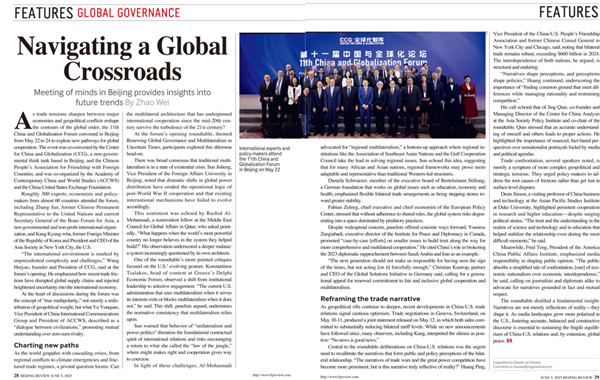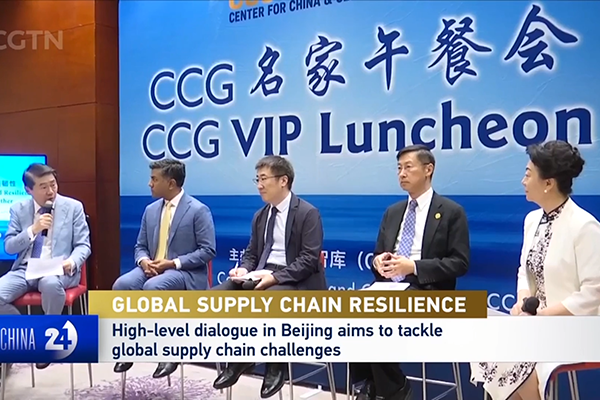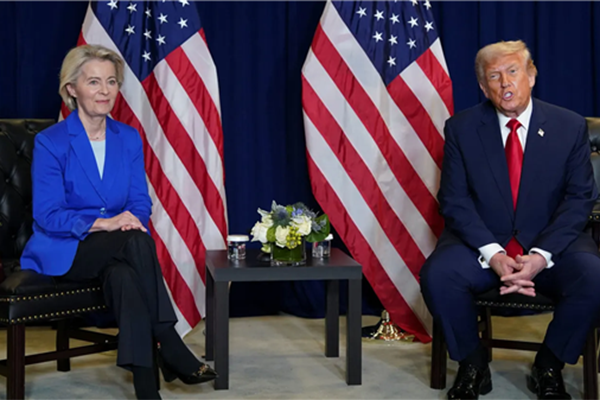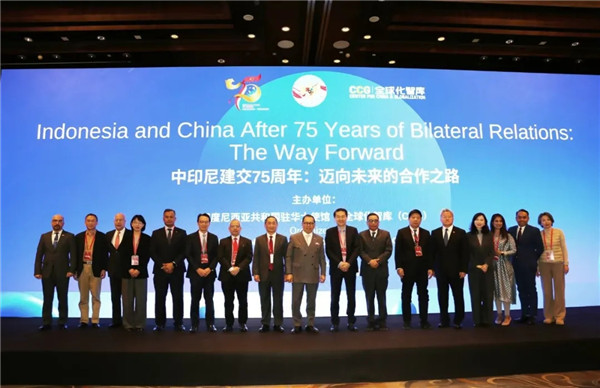Beijing Review | Navigating a Global Crossroads
June 03 , 2025Meeting of minds in Beijing provides insights into future trends
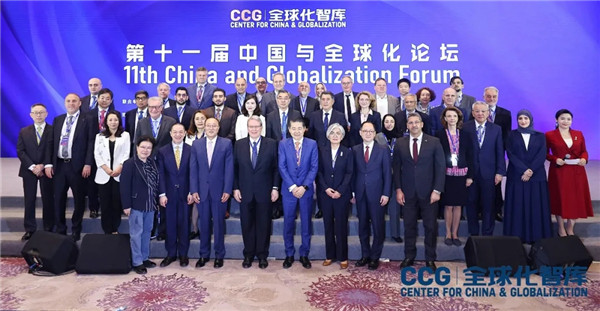
International experts and policy-makers attend the 11th China and Globalization Forum in Beijing on May 22
As trade tensions sharpen between major economies and geopolitical conflicts reshape the contours of the global order, the 11th China and Globalization Forum convened in Beijing from May 22 to 24 to explore new pathways for global cooperation. The event was co-convened by the Center for China and Globalization (CCG), a non-governmental think tank based in Beijing, and the Chinese People’s Association for Friendship with Foreign Countries, and was co-organized by the Academy of Contemporary China and World Studies (ACCWS) and the China-United States Exchange Foundation.
Roughly 300 experts, economists and policy-makers from almost 60 countries attended the forum, including Zhang Jun, former Chinese Permanent Representative to the United Nations and current Secretary General of the Boao Forum for Asia, a non-governmental and non-profit international organization, and Kang Kyung-wha, former Foreign Minister of the Republic of Korea and President and CEO of the Asia Society in New York City, the U.S.
“The international environment is marked by unprecedented complexity and challenges,” Wang Huiyao, founder and President of CCG, said at the forum’s opening. He emphasized how recent trade frictions have disrupted global supply chains and injected heightened uncertainty into the international economy.
At the heart of discussions during the forum was the concept of “true multipolarity,” not merely a redistribution of geopolitical weight, but what Yu Yunquan, Vice President of China International Communications Group and President of ACCWS, described as a “dialogue between civilizations,” promoting mutual understanding over zero-sum rivalry.
Charting new paths
As the world grapples with cascading crises, from regional conflicts to climate emergencies and fractured trade regimes, a pivotal question looms: Can the multilateral architecture that has underpinned international cooperation since the mid-20th century survive the turbulence of the 21st century?
At the forum’s opening roundtable, themed Renewing Global Governance and Multilateralism in Uncertain Times, participants explored this dilemma head-on.
There was broad consensus that traditional multilateralism is in a state of existential crisis. Sun Jisheng, Vice President of the Foreign Affairs University in Beijing, noted that dramatic shifts in global power distribution have eroded the operational logic of post-World War II cooperation and that existing international mechanisms have failed to evolve accordingly.
This sentiment was echoed by Rashid Al-Mohannadi, a nonresident fellow at the Middle East Council for Global Affairs in Qatar, who asked pointedly, “What happens when the world’s most powerful country no longer believes in the system they helped build?” His observation underscored a deeper malaise: a system increasingly questioned by its own architects.
One of the roundtable’s more pointed critiques focused on the U.S.’ evolving posture. Konstantinos Tsalakos, head of content at Greece’s Delphi Economic Forum, observed a shift from institutional leadership to selective engagement. “The current U.S. administration that uses multilateralism when it serves its interests exits or blocks multilateralism when it does not,” he said. This shift, panelists argued, undermines the normative consistency that multilateralism relies upon.
Sun warned that behavior of “unilateralism and power politics” threatens the foundational contractual spirit of international relations and risks encouraging a return to what she called the “law of the jungle,” where might makes right and cooperation gives way to coercion.
In light of these challenges, Al-Mohannadi advocated for “regional multilateralism,” a bottom-up approach where regional institutions like the Association of Southeast Asian Nations and the Gulf Cooperation Council take the lead in solving regional issues. Sun echoed this idea, suggesting that for many African and Asian nations, regional frameworks may prove more adaptable and representative than traditional Western-led structures.
Daniela Schwarzer, member of the executive board of Bertelsmann Stiftung, a German foundation that works on global issues such as education, economy and health, emphasized flexible bilateral trade arrangements as being stepping stones toward greater stability.
Fabian Zuleeg, chief executive and chief economist of the European Policy Center, stressed that without adherence to shared rules, the global system risks degenerating into a space dominated by predatory practices.
Despite widespread concern, panelists offered concrete ways forward. Youness Zangiabadi, executive director of the Institute for Peace and Diplomacy in Canada, promoted “case-by-case [efforts] on smaller issues to build trust along the way for more comprehensive and multilateral cooperation.” He cited China’s role in brokering the 2023 diplomatic rapprochement between Saudi Arabia and Iran as an example.
“The next generation should not make us responsible for having seen the sign of the times, but not acting [on it] forcefully enough,” Christian Kastrop, partner and CEO of the Global Solutions Initiative in Germany said, calling for a generational appeal for renewed commitment to fair and inclusive global cooperation and multilateralism.
Reframing the trade narrative
As geopolitical rifts continue to deepen, recent developments in China-U.S. trade relations signal cautious optimism. Trade negotiations in Geneva, Switzerland, on May 10-11, produced a joint statement released on May 12, in which both sides committed to substantially reducing bilateral tariff levels. While no new announcements have followed since, many observers, including Kang, interpreted the silence as positive: “No news is good news.”
Central to the roundtable deliberations on China-U.S. relations was the urgent need to recalibrate the narratives that form public and policy perceptions of the bilateral relationship. “The narratives of trade wars and the great power competition have become more prominent, but is this narrative truly reflective of reality?” Huang Ping, Vice President of the China-U.S. People’s Friendship Association and former Chinese Consul General in New York City and Chicago, said, noting that bilateral trade remains robust, exceeding $660 billion in 2024. The interdependence of both nations, he argued, is structural and enduring.
“Narratives shape perceptions, and perceptions shape policies,” Huang continued, underscoring the importance of “finding common ground that meet differences while managing rationality and restraining competition.”
His call echoed that of Jing Qian, co-founder and Managing Director of the Center for China Analysis at the Asia Society Policy Institute and co-chair of the roundtable. Qian stressed that an accurate understanding of oneself and others leads to proper actions. He highlighted the importance of nuanced, fact-based perspectives over sensationalist portrayals fueled by media and political agendas.
Trade confrontation, several speakers noted, is merely a symptom of more complex geopolitical and strategic tensions. They urged policy-makers to address the root causes of frictions rather than get lost in surface-level disputes.
Denis Simon, a visiting professor of China business and technology at the Asian Pacific Studies Institute at Duke University, highlighted persistent cooperation in research and higher education—despite surging political strains. “The trust and the understanding in the realms of science and technology and in education that helped stabilize the relationship even during the most difficult moments,” he said.
Meanwhile, Fred Teng, President of the America China Public Affairs Institute, emphasized media responsibility in shaping public opinion. “The public absorbs a simplified tale of confrontation, [one] of economic nationalism over economic interdependence,” he said, calling on journalists and diplomats alike to advocate for narratives grounded in fact and mutual respect.
The roundtable distilled a fundamental insight: Narratives are not merely reflections of reality—they shape it. As media landscapes grow more polarized in the U.S., fostering accurate, balanced and constructive discourse is essential to sustaining the fragile equilibrium of China-U.S. relations and, by extension, global peace.
From Beijing Review, 2025-6-3
